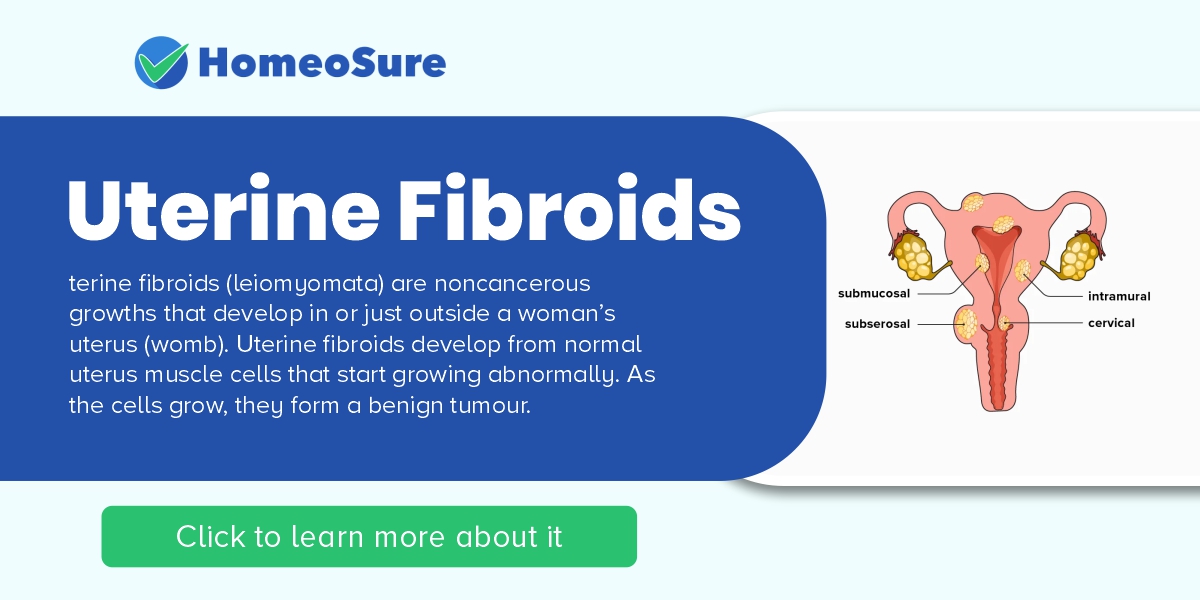Uterine Fibroids
Uterine fibroids (leiomyomata) are noncancerous growths that develop in or just outside a woman’s uterus (womb). Uterine fibroids develop from normal uterus muscle cells that start growing abnormally. As the cells grow, they form a benign tumour.
Types of Uterine Fibroids
- All uterine fibroids are similar in their makeup: All are made of abnormal uterine muscle cells growing in a tight bundle or mass. Uterine fibroids are sometimes classified by where they grow in the uterus:
- Myometrial (intramural) fibroids are in the muscular wall of the uterus.
- Submucosal fibroids grow just under the interior surface of the uterus, and may protrude into the uterus.
- Subserosal fibroids grow on the outside wall of the uterus.
- Pedunculated fibroids usually grow outside of the uterus, attached to the uterus by a base or stalk.
CAUSES OF UTERINE FIBROIDS
No one knows what causes uterine fibroids, but their growth seems to depend on estrogen, the female hormone. Uterine fibroids don’t develop until after puberty, and usually after age 30. Uterine fibroids tend to shrink or disappear after menopause, when estrogen levels fall.
Factors may influence development of uterine fibroids:
- Pregnancy: Women who have had children are less likely to get fibroids.
- Early menstruation: Women whose first period was before age 10 are more likely to have uterine fibroids.
- Women taking birth control pills are less likely to develop significant uterine fibroids.
- Family history: Women whose mothers and sisters have uterine fibroids are more likely to have them.
SYMPTOMS OF UTERINE FIBROIDS
Many women are unaware they have fibroids because they don’t have any symptoms. Women who do have symptoms (around one in three) may experience:
- Heavy periods or painful periods
- Abdominal pain
- Lower back pain
- Frequent need to urinate
- Constipation
- Pain or discomfort during sex
COMPLICATIONS
Although fibroids are not exactly life threatening, they can cause a few complications if not taken care of:
- Anaemia: Anaemia is when haemoglobin concentration in the blood decreases and in this case, anaemia occurs due to heavy blood flow.
- Retention of Urine: Large fibroids may put pressure on the urinary bladder to cause urine retention, i.e. inability to empty the bladder partially or completely.
- Painful Defecation: Similarly, pressure on the rectum may cause painful passing of stools.
- Difficulty in conceiving: It is possible that in some cases, fibroids may prevent pregnancy by preventing the implantation and growth of the embryo.
HOMEOPATHIC TREATMENT
Homeopathic medicines are very effective in regularizing menstrual bleeding and managing the pain. This can be done extremely gently and without any fear of unwanted side effects, unlike the hormonal treatments of Conventional medicine.Early and mild or moderate cases of Uterine fibroid often respond to homeopathy. Large and multiple fibroids may take very long, and homeopathy may not be suggested for those cases.
Homeopathic treatment is targeted towards UPROOTING THE DISEASE and ensuring health with no side effects. For prescribing to an individual, a PLAN OF TREATMENT is followed which involves:
- GETTING THOROUGH UNDERSTANDING OF CASE which includes complete case taking (analyzing patient as an individual) along with patient history and family history
- DIAGNOSIS OF PATIENT AND DISEASE
- INDIVIDUAL ASSESSMENT OF THE CASE
- PRESCRIBING THE MOST SUITABLE INDIVIDUAL CONSTITUTIONAL REMEDY
